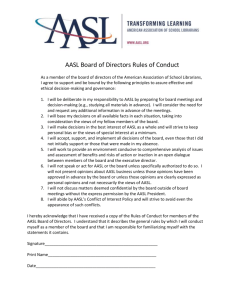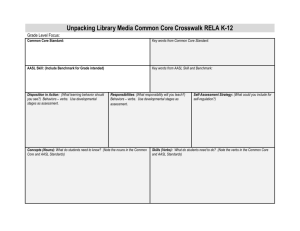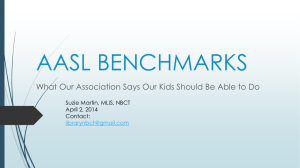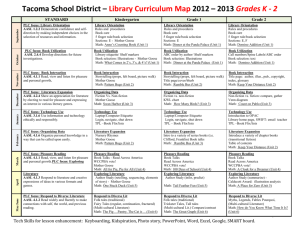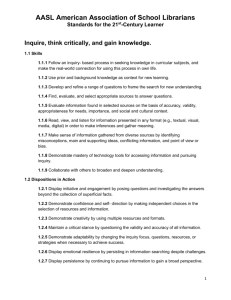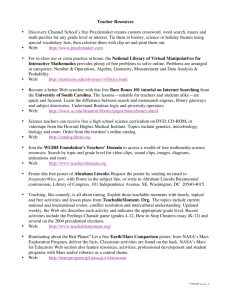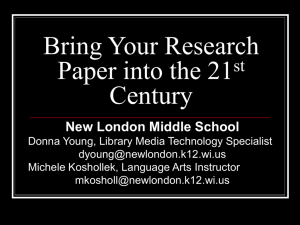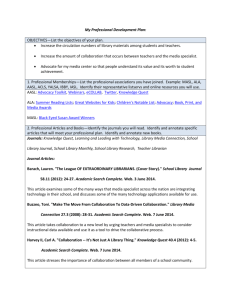Document 11061113
advertisement
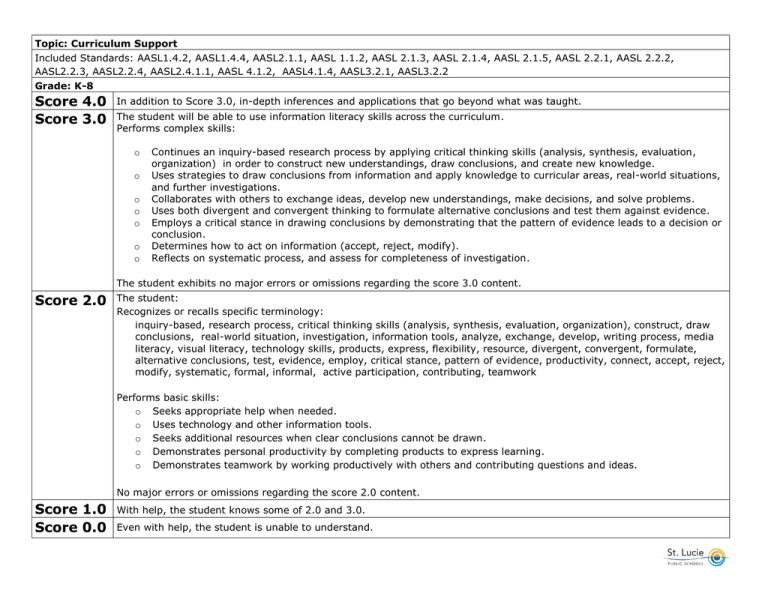
Topic: Curriculum Support Included Standards: AASL1.4.2, AASL1.4.4, AASL2.1.1, AASL 1.1.2, AASL 2.1.3, AASL 2.1.4, AASL 2.1.5, AASL 2.2.1, AASL 2.2.2, AASL2.2.3, AASL2.2.4, AASL2.4.1.1, AASL 4.1.2, AASL4.1.4, AASL3.2.1, AASL3.2.2 Grade: K-8 Score 4.0 Score 3.0 In addition to Score 3.0, in-depth inferences and applications that go beyond what was taught. The student will be able to use information literacy skills across the curriculum. Performs complex skills: o o o o o o o Continues an inquiry-based research process by applying critical thinking skills (analysis, synthesis, evaluation, organization) in order to construct new understandings, draw conclusions, and create new knowledge. Uses strategies to draw conclusions from information and apply knowledge to curricular areas, real-world situations, and further investigations. Collaborates with others to exchange ideas, develop new understandings, make decisions, and solve problems. Uses both divergent and convergent thinking to formulate alternative conclusions and test them against evidence. Employs a critical stance in drawing conclusions by demonstrating that the pattern of evidence leads to a decision or conclusion. Determines how to act on information (accept, reject, modify). Reflects on systematic process, and assess for completeness of investigation. The student exhibits no major errors or omissions regarding the score 3.0 content. Score 2.0 The student: Recognizes or recalls specific terminology: inquiry-based, research process, critical thinking skills (analysis, synthesis, evaluation, organization), construct, draw conclusions, real-world situation, investigation, information tools, analyze, exchange, develop, writing process, media literacy, visual literacy, technology skills, products, express, flexibility, resource, divergent, convergent, formulate, alternative conclusions, test, evidence, employ, critical stance, pattern of evidence, productivity, connect, accept, reject, modify, systematic, formal, informal, active participation, contributing, teamwork Performs basic skills: o Seeks appropriate help when needed. o Uses technology and other information tools. o Seeks additional resources when clear conclusions cannot be drawn. o Demonstrates personal productivity by completing products to express learning. o Demonstrates teamwork by working productively with others and contributing questions and ideas. No major errors or omissions regarding the score 2.0 content. Score 1.0 Score 0.0 With help, the student knows some of 2.0 and 3.0. Even with help, the student is unable to understand. Topic: Personal Literary and Informational Text Included Standards: AASL1.1.1, AASL 1.1.2, AASL 1.1.3, AASL 1.1.6, AASL 1.1.8, AASL 1.2.2, AASL 1.3.4, AASL 4.1.1, AASL 4.1.2, AASL 4.1.3, AASL 4.1.4, AASL 4.1.5, AASL 4.1.6, AASL 4.1.7, AASL 4.1.8, AASL 4.2.1, AASL 4.2.2, AASL 4.2.4, AASL 4.3.3, AASL 4.3.4, AASL 4.4.1, AASL 4.4.2, AASL 4.4.3, AASL 4.4.4, AASL 4.4.5, AASL 4.4.6 Grade: K-8 Score 4.0 Score 3.0 In addition to Score 3.0, in-depth inferences and applications that go beyond what was taught. The student will be able to use literary and informational text for personal growth. Performs complex skills: o o o o o o o Makes inferences and gather meaning. Applies confidence and self-direction in making independent choices. Responds to literature and creative expressions in various formats and genres. Connects ideas to own interests and previous knowledge. Uses creative an artistic formats to express personal learning. Demonstrates motivation by seeking information beyond academic requirements. Interprets new information based on cultural and social context. The student exhibits no major errors or omissions regarding the score 3.0 content. Score 2.0 The student: Recognizes or recalls specific terminology: Inquiry- based, real world connection, context, format (textual, visual, media, digital), accessing information, learning community, process, revise, strategies, varied roles, viewpoints, literature, genres, information tools, creative formats, artistic formats, social media, aesthetic growth, personal growth, ethical behaviors. Performs basic skills: o o o o o Reads, views, and listens for information presented in any format. Contributes to the exchange of ideas within the learning community. Reads, views, and listens for pleasure and personal growth to make real-work connections with self, world, and previous reading. Shows appreciation for literature by electing to read for pleasure. Recognizes how to focus efforts in personal learning. No major errors or omissions regarding the score 2.0 content. Score 1.0 Score 0.0 With help, the student knows some of 2.0 and 3.0. Even with help, the student is unable to understand. Topic: Media Skills and Responsibilities Included Standards: AASL1.1.8, AASL 1.3.1, AASL1.3.2, AASL1.3.3, AASL1.4.4, AASL2.3.1, AASL2.3.2, AASL2.3.3,AASL3.1.6, AASL3.2.2, AASL3.3.1,AASL3.3.4,AASL3.3.7,AASL3.4.2, AASL4.2.3, AASL4.3.1, AASL4.3.4 Grade: K-8 Score 4.0 Score 3.0 In addition to Score 3.0, in-depth inferences and applications that go beyond what was taught. The student will understand how to utilize information seeking tools and will be able to apply informational and literary resources in an ethical and responsible manner. Performs complex skills: o o o o o o Uses information technology responsibly. Uses valid information and reasoned conclusions to make ethical decisions. Uses information technology ethically and responsibly. Solicits and respects diverse perspectives while searching for information, collaborating with others, and participating as a member of the community. Applies the principles of intellectual freedom. Assesses the quality and effectiveness of the learning product. The student exhibits no major errors or omissions regarding the score 3.0 content. Score 2.0 The student: Recognizes or recalls specific terminology: Technology tools, copyright, intellectual property, creator, producer, ethical, legal, perspective, divergent, responsible, appropriate, analyze, connect, diverse, global perspectives, drawing conclusions, valid, reasoned, teamwork, active participation, solicit, respect, collaborating, authentic, viewpoints, intellectual freedom, learning community, debate, assess, revise, strategies, effective, learning product, evaluate, concern, opinions, changing opinions, genres, social exchange, resources Performs basic skills: o Demonstrates mastery of technology tools for accessing information and pursuing inquiry. o Respects copyright /intellectual property rights of creators and producers. o Seeks divergent perspectives during information gathering and assessment. o Follows ethical and legal guidelines in gathering and using information. o Seeks appropriate help when needed. o Respects the differing interests and experiences of others and seek a variety of viewpoints. o Participates in the social exchange of ideas, both electronically and in person. o Recognizes that resources are created for a variety of purposes. No major errors or omissions regarding the score 2.0 content. Score 1.0 Score 0.0 With help, the student knows some of 2.0 and 3.0. Even with help, the student is unable to understand. Topic: Research Included Standards: AASL: 1.1.2, AASL 1.1.3, AASL 1.1.4, AASL 1.1.5, AASL 1.1.6, AASL 1.1.7, AASL 1.1., AASL 1.1.9, AASL 1.2.1, AASL 1.2.2, AASL 1.2.3, AASL 1.2.4, AASL 1.2.5, AASL 1.2.6, AASL 1.2.7, AASL 1.3.1, AASL 1.3.2, AASL 1.3.4, AASL 1.4.1, AASL1.4.3, AASL1.4.4, AASL2.1.1, AASL2.1.2, AASL 2.1.3, AASL 2.1.4, AASL 2.1.5, AASL 2.2.1, AASL 2.2.2, AASL 2.2.3, AASL 2.2.4, AASL2.4.1, AASL2.4.2, AASL2.4.3, AASL2.4.4, AASL3.1.1, AASL3.4.1, AASL4.1.7 Grade: K-8 Score 4.0 Score 3.0 In addition to Score 3.0, in-depth inferences and applications that go beyond what was taught. Score 2.0 The student: Recognizes or recalls specific terminology: Research, prior knowledge, inquiry, synthesis, evaluate, appropriate sources, accuracy, validity, social context, cultural context, format (textual, visual, media, digital), diverse sources, misconceptions, main idea, supporting idea, conflicting information, initiative, investigation, collection, superficial facts, self-direction, resources, strategies, critical stance, inquiry focused, perspectives, divergent perspectives, persistence, copyright, intellectual property, ethical, learning community, information technology, bibliography. Performs basic skills: o Demonstrates mastery of technology tools for accessing information and pursuing inquiry. o Uses multiple resources and formats when researching. o Seeks additional resources when clear conclusions cannot be drawn. o Uses technology and other information tools to organize and display knowledge and understanding in ways that others can view, use, and assess. No major errors or omissions regarding the score 2.0 content. Score 1.0 Score 0.0 With help, the student knows some of 2.0 and 3.0. The student will be able to use a systematic process for the collection, processing, and presentation of information. Performs complex skills: o Uses evaluative criteria to select appropriate reference materials such as maps, charts and photos to gather information. o Displays initiative and engagement by posing questions and investigating the answers beyond the collection of superficial facts. o Maintains a critical stance by questioning the validity and accuracy of all information. o Demonstrates adaptability and creativity by using multiple resources and formats. o Organizes and synthesize research. o Uses the writing process, media and visual literacy, and technology skills to create products that express new understandings. o Demonstrates flexibility in the use of resources by adapting information strategies to each specific resource. o Uses technology and other information tools to organize and display knowledge and understanding in ways that others can view, use, and assess. o Concludes an inquiry-based research process by sharing new understandings and reflecting on the learning. The student exhibits no major errors or omissions regarding the score 3.0 content. Even with help, the student is unable to understand.
